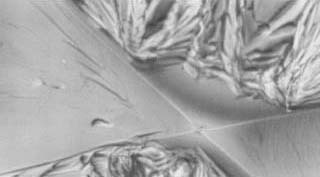Anticoagulant
Anticoagulants are substances that inhibit coagulation (clotting) of the blood. They are used to keep stored blood for transfusions from clotting, to treat conditions involving dangerous blood clotting (includings strokes and heart disease), and in situations where there is a serious risk of dangerous clotting, such as during certain surgical procedures.
For centuries, medical practitioners had used leeches to suck blood from patients. In 1884 J. B. Haycraft showed that blood flowed freely during this procedure because the leeches secreted an anticoagulant (anti-clotting) factor. A dry, powdered extract of leeches' heads called hirudin was introduced around 1900 and used in physiological experiments (tests relating to the functioning of the human body), although it was not used in clinical practice. New research on hirudin in the 1990s has led to an experimental drug shown to be safe and effective. Although production of this substance is currently expensive, it may eventually provide another anticoagulant option.
Prior to the discovery of hirudin, donated blood tended to clot before it was absorbed into the recipient's blood system; as a result, transfusions were not always effective. In 1869, sodium phosphate was introduced as an anticoagulant to overcome this problem. In 1914 sodium citrate was also shown to be an effective anticoagulant for donated blood. Sodium citrate's use was of great value during World War I (1914-1918) and became the standard by 1917.

Heparin
The main anticoagulants used today, are heparin, which is injected, and coumarin, which is taken orally (by mouth). Heparin was discovered in 1916 by Jay McLean (1890-1957), a medical student. McLean was studying at Johns Hopkins University under William Ho well (1860-1945), who had been investigating blood coagulation for years. McLean took on the project of preparing pure samples of cephalin, a clotting substance obtained from brain tissue. While extracting compounds similar to cephalin from heart and liver tissue, McLean discovered that the liver extract did not cause blood to clot. McLean called the extract heparphosphatid.
After McLean left Johns Hopkins, Howell continued working on the liver extract, aided by Emmett Holt (1855-1924). The researchers developed ways to extract an improved water-soluble anticoagulant from liver, which they named heparin in 1918. Howell continued his work on heparin during the 1920s, while Charles Best (1899-1978), David Scott, and Arthur Charles of the University of Toronto worked with heparin extracted from beef liver. They eventually developed practical methods for purifying and standardizing the drug. Clinical trials followed. The success of the artificial kidney in 1944 and the later development of heartlung bypass procedures depended on the use of heparin to prevent fatal blood clotting. Heparin then came into standard use, although it does carry a possible risk of excessive bleeding.
Coumarin and Warfarin
Oral anticoagulants have their origins in an odd bleeding disorder in cattle that broke out in North Dakota and Canada in the 1920s. Cattle in these areas that ate hay made from spoiled sweet clover had a tendency to bleed to death. F. W. Schofield, a Canadian veterinarian, traced the deaths to clover in 1922. In 1931 a North Dakota veterinarian, L. M. Roderick, found that the hemorrhaging was caused by the reduced activity of prothrombin, a clotting factor in blood. Isolating prothrombin proved to be very difficult, but it was finally accomplished in 1939 by Karl Link and H. A. Campbell of the University of Wisconsin agricultural college. The clotting factor in prothrombin turned out to be dicumarol, a coumarin (a fragrant organic substance often extracted from tonka beans) compound that had originally been synthesized in an impure form in 1903.
In 1948 a potent synthetic form of dicumarol was originally introduced as an extremely effective rodent (small mammals of the order Rodentia, which includes rats, squirrels, and beavers) poison called warfarin (named for the patent holder, Wisconsin Alumni Research Foundation). Although warfarin rapidly became very popular worldwide as a rat poison, medical practitioners hesitated to use it on patients because it seemed so toxic (poisonous). This viewpoint changed after a United States army recruit unsuccessfully attempted suicide in 1951 by taking massive doses of warfarin-based rat poison. Warfarin is now the most widely prescribed oral anticoagulant.
Recent Developments
Research from the 1970s to 1990s has shown that the common painkiller aspirin has anticoagulant properties. In fact, doctors have recommended it for preventing blood clots near the heart. Apirin's fairly narrow in its effectiveness, however, and does not work as well to prevent strokes, blood clots in the legs, or clotting during surgery. Unfortunately, in order to do their job, anticoagulants suppress the human body's natural clotting process, which is used to heal wounds. Those patients on anticoagulants must always beware of excessive bleeding while taking the medication.
[See also Artificial kidney ]